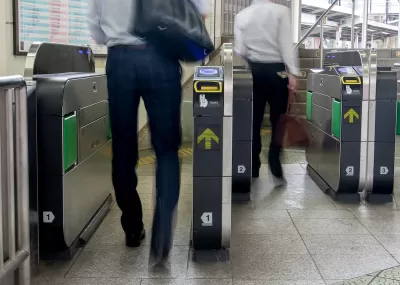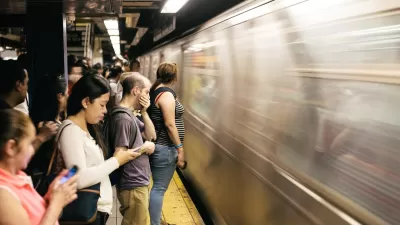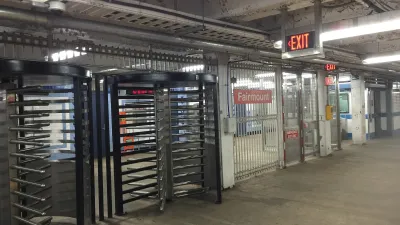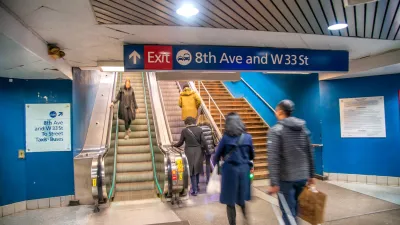Transit agencies hope to reassure riders concerned about crime by boosting security at transit stations.

Transit systems around the country are attempting to counter a perception of increased crime by cracking down on fare evasion, reports Jeff McMurray for My Panhandle.
In East St. Louis, Illinois, “MetroLink has begun adding 8-foot (2.4-meter) metal gates to ensure customers can’t enter the platform without a valid fare card. That’s a major change from the honor system the two-state light rail had employed since its inception in 1993, with fares only enforced through onboard spot checks and the threat of fines for repeat violators.” Other systems are implementing stricter fare verification mechanisms, too.
Kevin Scott, general manager for security at Bi-State Development, the agency overseeing transit in East St. Louis, says the new gates are “less about catching fare-skippers than improving safety” by preventing criminals from entering the transit system.
Other agencies have decided catching a few fare evaders isn’t worth the high cost of new enforcement mechanisms. “Sound Transit, which operates the regional light rail system in the Seattle area, has never had fare gates and has no plans to add them after one study concluded the systemwide cost could approach $200 million.”
FULL STORY: Transit systems are targeting fare evaders to win back riders leery about crime

Maui's Vacation Rental Debate Turns Ugly
Verbal attacks, misinformation campaigns and fistfights plague a high-stakes debate to convert thousands of vacation rentals into long-term housing.

Planetizen Federal Action Tracker
A weekly monitor of how Trump’s orders and actions are impacting planners and planning in America.

Chicago’s Ghost Rails
Just beneath the surface of the modern city lie the remnants of its expansive early 20th-century streetcar system.

Bend, Oregon Zoning Reforms Prioritize Small-Scale Housing
The city altered its zoning code to allow multi-family housing and eliminated parking mandates citywide.

Amtrak Cutting Jobs, Funding to High-Speed Rail
The agency plans to cut 10 percent of its workforce and has confirmed it will not fund new high-speed rail projects.

LA Denies Basic Services to Unhoused Residents
The city has repeatedly failed to respond to requests for trash pickup at encampment sites, and eliminated a program that provided mobile showers and toilets.
Urban Design for Planners 1: Software Tools
This six-course series explores essential urban design concepts using open source software and equips planners with the tools they need to participate fully in the urban design process.
Planning for Universal Design
Learn the tools for implementing Universal Design in planning regulations.
planning NEXT
Appalachian Highlands Housing Partners
Mpact (founded as Rail~Volution)
City of Camden Redevelopment Agency
City of Astoria
City of Portland
City of Laramie





























